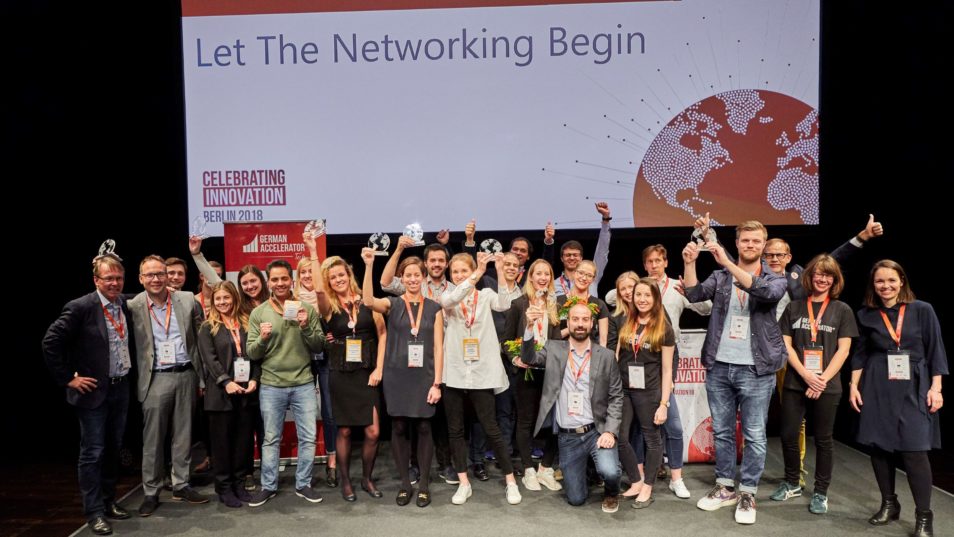Bringing a Startup to the U.S.

The biggest difference between business in the US and Germany? According to two German startup founders, it’s not tax laws, investment models or mindsets. It’s small talk.
Johanna Joch, General Manager for Speechagain, a speech-therapy web-based platform, moved to New York in 2017 to bring the program to the US market. Communication differences were the first thing she noticed.
“Business meetings here are totally different,” Joch said. “In Germany, we are more formal and direct. Here there’s a lot of small talk, and then at some point you dive in and speak directly.”

American small talk and politeness can be conceived as inauthentic to Germans. This is especially true in the business world.
“I like that people here are polite,” Joch said, “but sometimes it’s hard to figure out if they are interested in your product or not.”
Felix Wunderlich, Head of Business Development at MyPostcard, a personalized postcard-mailing app, liked this about the American business scene. Relationship-building was quickly useful for him.
“Small talk lets you get to know more people in a shorter amount of time,” Wunderlich said. “Building a network is easier here, and people are really helpful. They’ll forward you their contacts, and it all happens very fast.”
Both Joch’s Speechagain and Wunderlich’s MyPostcard entered the US with the help of German Accelerator New York. This German government-funded program provides training, mentorship and office space to competitively-selected German startups hoping to bring their businesses to the US. For the startups, it is completely free of charge.
The German Accelerator has hubs in New York, Silicon Valley, Cambridge, MA, and Singapore. Annually they invite about twenty startups to the US in four different quarterly clusters. Selected startups participate in the program for three months with the option to apply for an extension.
This short-term program helps German startups get their footing in a crowded and deceivingly complicated US startup scene. Participating startups can still feel growing pains, however.
Germans oftentimes struggle learning to pitch their products in the US. Unlike in Germany where product details are the most essential part of a pitch, storytelling is critical to hooking an American buyer’s attention.
“It seems like Americans grow up learning to pitch and sell things because they’re such naturals at it,” said Stephanie Korbely, Program & Marketing Manager at German Accelerator.
To aid the German founders in their program, German Accelerator hires pitching coaches to teach program participants. They also provide info sessions on the many questions they know will come up, including taxes, legal issues, and recruiting.
Interestingly, it was these fine details that made Johanna Joch most nervous. Knowing antidiscrimination is important to Americans, and legal action can be taken quickly, Joch feared she would make a mistake when conducting interviews for team members. In Germany, by contrast, resumes often include photos and the applicant’s age, birthplace and nationality.
“I really prepared myself for my first interview,” said Joch. “I practiced because I didn’t want to get into any legal issues.”
“When startups initially come here, they think the U.S. is going to be similar to Germany, but the business mentality is actually quite different,” said Korbely.
One of the biggest assets German Accelerator provides is mentors who have expertise in the startup’s field. Upon joining the program, the startups gain access to a pool of almost 200 expert mentors from different industries and disciplines. To Speechagain and MyPostcard, this was the biggest asset.

“Mentoring is really what takes you to the next level,” said MyPostcard’s Felix Wunderlich. “The German Accelerator has very qualified mentors, and they help you look at yourself from a different angle.”
Both Speechagain and MyPostcard decided to try their luck in the US simply because they saw a market gap they thought they could fill. For Speechagain that gap was the expense and accessibility of speech therapy.
“In Germany speech therapy is paid for by health insurance,” said Johanna Joch. “In the US, even if you have health insurance, speech therapy is not always covered. We wanted to benefit both people who stutter and the speech-language pathologist, and the US is the biggest market for this.”
For MyPostcard, entry into the US was about becoming a global company.
“It costs $1.99 to send a postcard, so it’s a niche market, and you have to be a market leader.” Gaining influence in the US was an important start.
“Every important global company has an entity here, so it’s easy to meet with people” Wunderlich said. “People take you more seriously when you’re here.”
There are countless examples of German startups entering the US without the backing of a program like German Accelerator. But the moral of the story is: having a resource on your side—one like the German Accelerator—can only benefit you.
